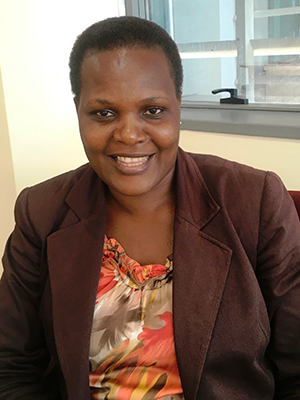
Winny Nekesa Akullo is the Head, Library and Documentation Centre at PPDA. She is currently the IASSIST Africa Regional Secretary. She recently took one of Wiki Education’s courses on Wikidata and reflects on her experience with the Wikimedia community in this guest blog post.
As a researcher on Linked Data, a new technological innovation in libraries moreso in developing countries, like Uganda, I gained interest in participating in this training because I really wanted to have first hand, hands-on experience on how Linked Data works. With recommendation from a colleague in another country, I applied for the Wikidata Institute course and with support from Wiki Education, I was able to realize this.
Wikidata was new to me, however, with Will Kent’s expert training, I gained a lot of knowledge which I am currently implementing. I was able to understand the basics of Wikidata and gain familiarity with its interface. I was so excited when I created my Wikidata first item. It helped me open my understanding of Linked Data, and I was able to create statements. I got to understand the three-part structure of a statement that connects an item, property and value. I was also able to add a few references to the items I created and also identify missing references in some of the other items.
One of the items I created was for Prof. Constant Okello-Obura, a Library professor at the East African School of Library and Information Science, Makerere University. One of the references I added was for Prof. Maria Musoke the Deputy Vice Chancellor at Kyambogo University. It was also interesting to learn that Wikidata records are not just statements but relationships between statements, which makes it possible to search information in a structured way which is one of the key principles of Linked Data. These relationships between things makes Wikidata a powerful resource for the entire internet and illustrating how millions of pieces of data relate to each other.
Another interesting thing I learnt was about using the SPARQL, a Wikidata query language that allows you to ask very specific questions about information included in Wikidata. Being able to visualize data which is perfect for knowledge graphs was an eye opener. Having these different visualization tools to represent the results of your query with different visualizations was something I very much appreciated. I found out the need to write a query using variables, specific properties, and item and the query is the best way to find meaning of linked data.
I am was glad to learn that Wikidata is a centralized location of information about the same concepts, things or people. It is a Linked Data repository for all Wikimedia projects. In addition, databases are linking their items to Wikidata as a database of databases. Therefore, it is imperative that libraries from Uganda and Africa can utilize this opportunity to link their databases or create one for wider access and visibility of their library data.
My humble request is that to have a wider participation of participants from developing countries to contribute to Wikidata. I am very grateful to Wiki Education for the financial support I was given, the group cohort teammates for the great interactions we had and our instructor, Will Kent for his patient expert training during the course of the training. I am glad that I am now a member of the Wikidata community and I will continue to make my contributions. Thank you very much for this opportunity. Asante Sana!!
Image credit: Winny.nekesa, CC BY-SA 4.0, via Wikimedia Commons

Inspiring
It appears that Wiki Education chose a very able and willing participant for this course. I hope you are granted the funds and support to continue this.
Great inspiration to us the young and zealous generation.
Nyangoma Judith
Winny Nekesa’s contribution here, tells you how much she can teach others. She was my supervisor at UBOS before moving to PPDA and NSSF Uganda, and has enabled me attend many data groups like Library 2.0 and IASSIST. I have attended many data workshops because of her. Thank you, Winny!
It is my first time to hear of Wikidata. It must be an interesting area of study.